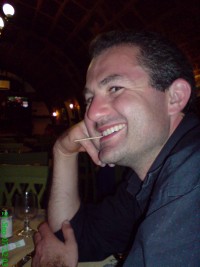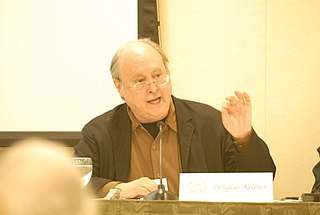Postmodernism is an intellectual stance or mode of discourse characterized by skepticism toward the "grand narratives" of modernism; rejection of epistemic certainty or the stability of meaning; and sensitivity to the role of ideology in maintaining political power. Claims to objectivity are dismissed as naïve realism, with attention drawn to the conditional nature of knowledge claims within particular historical, political, and cultural discourses. The postmodern outlook is characterized by self-referentiality, epistemological relativism, moral relativism, pluralism, irony, irreverence, and eclecticism; it rejects the "universal validity" of binary oppositions, stable identity, hierarchy, and categorization.

In evolutionary biology, punctuated equilibrium is a theory that proposes that once a species appears in the fossil record, the population will become stable, showing little evolutionary change for most of its geological history. This state of little or no morphological change is called stasis. When significant evolutionary change occurs, the theory proposes that it is generally restricted to rare and geologically rapid events of branching speciation called cladogenesis. Cladogenesis is the process by which a species splits into two distinct species, rather than one species gradually transforming into another.

Posthumanism or post-humanism is an idea in continental philosophy and critical theory responding to the presence of anthropocentrism in 21st-century thought. It encompasses a wide variety of branches, including:
- Antihumanism: a branch of theory that is critical of traditional humanism and traditional ideas about the human condition, vitality and agency.
- Cultural posthumanism: a branch of cultural theory critical of the foundational assumptions of humanism and its legacy that examines and questions the historical notions of "human" and "human nature", often challenging typical notions of human subjectivity and embodiment and strives to move beyond archaic concepts of "human nature" to develop ones which constantly adapt to contemporary technoscientific knowledge.
- Philosophical posthumanism: a philosophical direction that draws on cultural posthumanism, the philosophical strand examines the ethical implications of expanding the circle of moral concern and extending subjectivities beyond the human species.
- Posthuman condition: the deconstruction of the human condition by critical theorists.
- Posthuman transhumanism: a transhuman ideology and movement which, drawing from posthumanist philosophy, seeks to develop and make available technologies that enable immortality and greatly enhance human intellectual, physical, and psychological capacities in order to achieve a "posthuman future".
- AI takeover: A variant of transhumanism in which humans will not be enhanced, but rather eventually replaced by artificial intelligences. Some philosophers and theorists, including Nick Land, promote the view that humans should embrace and accept their eventual demise as a consequence of a technological singularity. This is related to the view of "cosmism", which supports the building of strong artificial intelligence even if it may entail the end of humanity, as in their view it "would be a cosmic tragedy if humanity freezes evolution at the puny human level".
- Voluntary Human Extinction, which seeks a "posthuman future" that in this case is a future without humans.
A metanarrative is a narrative about narratives of historical meaning, experience, or knowledge, which offers a society legitimation through the anticipated completion of a master idea.
Niles Eldredge is an American biologist and paleontologist, who, along with Stephen Jay Gould, proposed the theory of punctuated equilibrium in 1972.

Saul Newman is a British political theorist who writes on post-anarchism. He is professor of political theory at Goldsmiths College, University of London.

Jonathan Donald Kramer was an American composer and music theorist.
Kate Soper is a British philosopher. She is currently Visiting Professor at the University of Brighton.

Douglas Kellner is an American academic who works at the intersection of "third-generation" critical theory in the tradition of the Frankfurt Institute for Social Research, or Frankfurt School, and in cultural studies in the tradition of the Birmingham Centre for Contemporary Cultural Studies, or the "Birmingham School". He has argued that these two conflicting philosophies are in fact compatible. He is currently the George Kneller Chair in the Philosophy of Education in the Graduate School of Education and Information Studies at the University of California, Los Angeles.

Robert Garner is a British political scientist, political theorist, and intellectual historian. He is a Professor Emeritus in the politics department at the University of Leicester, where he has worked for much of his career. Before working at Leicester, he worked at the University of Exeter and the University of Buckingham, and studied at the University of Manchester and the University of Salford.
Metamodernism is a term that refers to a range of developments observed in many areas of art, culture and philosophy, emerging in the aftermath of postmodernism, roughly at the turn of the 21st century. To many, it is characterized as mediations between aspects of modernism and postmodernism; for others the term suggests an integration of those sensibilities with premodern cultural codes as well. Metamodernism is one of a number of attempts to describe post-postmodernism.
Todd F. Davis is a prize-winning American poet and critic.

Kenneth Womack is an American writer, literary critic, public speaker, and music historian, particularly focusing on the cultural influence of the Beatles. He is the author of the bestselling Solid State: The Story of Abbey Road and the End of the Beatles and John Lennon, 1980: The Last Days in the Life.
Masahiko Aoki was a Japanese economist, Tomoye and Henri Takahashi Professor Emeritus of Japanese Studies in the Economics Department, and Senior Fellow of the Stanford Institute for Economic Policy Research and Freeman Spogli Institute for International Studies at Stanford University. Aoki was known for his work in comparative institutional analysis, corporate governance, the theory of the firm, and comparative East Asian development.
Robert T. Tally Jr. is a professor of English at Texas State University. His research and teaching focuses on the relations among space, narrative, and representation, particularly in U.S. and comparative literature, and he is active in the emerging scholarly fields of geocriticism, literary geography, and the spatial humanities. Tally is the editor of "Geocriticism and Spatial Literary Studies," a Palgrave Macmillan book series established in 2013. The translator of Bertrand Westphal's Geocriticism: Real and Fictional Spaces and the editor of Geocritical Explorations, In addition to his numerous essays on literature, criticism, and theory, Tally has written books on Herman Melville, Edgar Allan Poe, Kurt Vonnegut, and J.R.R. Tolkien's The Hobbit, as well as a critical introduction to the work of literary critic and theorist Fredric Jameson.
Carl A. Raschke is an American philosopher and theologian. Raschke is a Past Chair and Professor of Religious Studies Department at the University of Denver, specializing in continental philosophy, the philosophy of religion and the theory of religion. He was given the university lecturer award for 2020-2021. He is also listed with the affiliated faculty of the Global Center for Advanced Studies.
Michael Thomas is research professor at Liverpool John Moores University working primarily in the field of digital education in relation to social justice, the educational implications of disadvantage, online and distance education, digitally mediated communication and higher education policy.
Josephine Donovan is an American scholar of comparative literature who is a professor emerita of English in the Department of English at the University of Maine, Orono. Her research and expertise has covered feminist theory, feminist criticism, animal ethics, and both early modern and American literature with a special focus on American writer Sarah Orne Jewett and the local colorists. She recently extended her study of local color literature to the European tradition. Along with Marti Kheel, Carol J. Adams, and others, Donovan introduced ecofeminist care theory, rooted in cultural feminism, to the field of animal ethics. Her published corpus includes ten books, five edited books, over fifty articles, and seven short stories.
Ian Gregson is an English novelist and poet. His debut poetry collection Call Centre Love Song was shortlisted for a Forward Prize in 2006. In 2015, he was put forward for the position of Professor of Poetry at Oxford University.
Timothy Andres Brennan is a cultural theorist, professor of literature, public speaker, and activist. He is known for his work on American imperialism, the political role of intellectuals, Afro-Latin music, and the problem of the "human" and the humanities in an age of technoscience.






